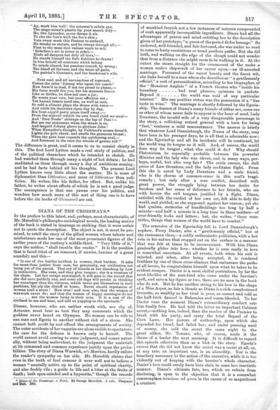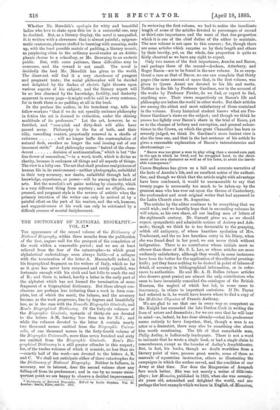DIANA OF THE CROSSWAYS.* IN the preface to this latest,
and, perhaps, most characteristic, of Mr. Meredith's philosopho-sociological novels, the leading motive of the book is stated in language so striking that it were unfair not to quote the description. The object is not, it must be premised, to retell the story of the gifted woman whose talents and misfortnnes made her one of the most prominent figures of the earlier years of the century's middle-third. " Very little of it," says the author, " shall trouble the reader." It is the position that is faced (that of an innocent, if unwise, heroine of a great scandal), and this
" Is one of the battles incident to women, their hardest. It asks for more than justice from men, for generosity, our civilisation not being yet of the purest. That cry of hounds at her disrobing by Law is instinctive. She runs, and they give tongue; she is a creature of the chase. Let her escape unmangled, it will pass in the record that she did once publicly run, and some old dogs will persist in thinking her cunninger than the virtuous, which never put themselves in such positions, but ply the distaff at home. Never should reputation of woman trail a scent ! How true ! and true also, that the women of waxwork never do; and that the women of happy marriages do not
nor the women lucky in their acts. It is a test of the civilised to see and hear, and add no yapping to the spectacle."
Dianas, however, who are neither wroth with, nor shy of, Actmons, must bear as best they may comments which the goddess never heard on Olympus. No woman can be wife to one man and Egeria to another without risk of a storm. She cannot both profit by and offend the arrangements of society. The outer accidents of her vagaries are alone visible to spectators ; the case for the defence is known only to herself. The world cannot avoid coming to some judgment, and comes natur ally, without being malevolent, to the judgment the materials at its command and common experience justify upon the probabilities. The story of Diana Warwick, nee Merrion, hardly enlists the reader's sympathy on her side. Mr. Meredith claims that even in the teeth of foul rumour it were well not to believe a woman "mentally active up to the point of spiritual charity, and also fleshly vile ; a guide to life and a biter at the fruits of death; both open-minded and a hypocrite," though the records of mankind furnish not a few instances of natures compounded of such apparently incompatible ingredients. Diana had all the advantages of person and mind entitling her to the description given of her prototype, "a queen of the period fit for homage." So endowed, well-friended, and fair-fortuned, she was under no need to come to hasty resolutions or tread perilous paths. But she did both, and walking on the edge of the slough could not wonder that from a distance she might seem to be walking in it. At the outset she steers straight for the commonest of the rocks a woman makes shipwreck of her career upon,—an ill-assorted marriage. Possessed of the rarest beauty and the finest wit, she links herself to a man whom she describes as " a gentlemanly official," a sort of personification, according to her biographer, of the " Monsieur Anglais " of a French theatre who " inside his boundary had neat phrases, opinions in packets.
Beyond it the world was void of any particular interest." His one positive virtue was the possession of a "fine taste in wine." The marriage is shortly followed by the Egeriaehip. The dearest of Diana's many friends of either sex, some one or other of whom never fails to appear in the hour of need, Lady Dunstane, the invalid wife of a very disagreeable personage in the story, a rollicking retired general with a turn for being "fast," ventures a mild remonstrance. The answer is briefly that whatever Lord Dannisburgh, the Numa of the story, may have been in his younger days, he is all that is admirable now ; and the Egeriaship and all its incidents will be continued, let the world-wag its tongue as it will. And, of course, the world does wag its tongue ; what else could it do P Why should Platonicism be especially probable between the powerful Minister and the lady who was clever, and in many ways, perhaps, useful, but also very fair P The crisis ensues, the dull prose of Law threatens, and the lady meditates flight. From this she is saved by Lady Dunstane and a male friend, who is the chorus of common-sense in this soul's tragicomedy ; but only after a sore conflict, described with great power, the struggle lying between her desire for freedom and her sense of deference to her friends, who see with horror the evil tongues justified by a flight. Diana, satisfied with the verdict of her own set, felt able to defy the world, and yielded, as she supposed, against her reason ; yet she had qualms, memories of handholdings too long by half a minute—and half a minute is a long time in these matters—of over-friendly looks and letters ; but, she writes, "these were trifles, things that women of the world have to combat."
The reversion of the Egeriaship fell to Lord Dannisburgh's nephew, Percy Dacier, also a "gentlemanly official," but of the statesman class,—a coldly enthusiastic politician, with a hot vein in his nature that cropped out on the surface in a manner that was felt at times to be inconvenient. With him Diana gradually glides into love ; whether he is ever really in love is somewhat uncertain. At all events, both when his suit is rejected, and when, after being accepted, it is rendered fruitless by one of those cross-chances that embarrass the paths of all lovers, he congratulates himself upon what he takes to be evident escapes. Dacier is a most skilful portraiture, by far the most life-like of the men-kind who come under the heroine's spell, and save-a lay-figure or two, there are no men in the book who do not. But he has another string to his bow in the shape of a Miss Asper, as fair a blonde as Diana is a rich-complexioned brunette, as wealthy as her rival is poor, as correct and cold as the half-Irish damsel is Bohemian and warm-blooded. To her Dacier runs the moment Diana's extraordinary conduct sets him finally free. He had told the latter an important Cabinet secret,—nothing less, indeed, than the resolve of the Premier to break with his party, and carry the total Repeal of the Corn Laws. Her powers of authorship, upon which she depended for bread, had failed her; and under pressing need of money, she sold the secret the same night to the great editor, Mr. Tonans, who, of course, made it the theme of a leader the next morning. It is difficult to regard this episode otherwise than as a blot in the story. Egeria's excuse that she did not know the secret was a secret at all, or, at any rate, an important one, is an absurdity. Nor is the treachery necessary to the action cf the narrative, while it is too violently out of keeping with the heroine's whole character. Dacier's love could surely have been slain in some less inartistic manner. Diana's ultimate fate, too, which we refrain from disclosing, is open to the objection that it is a somewhat commonplace terminus ad quern in the career of so magnificent a creature. Whether Mr. Meredith's apologia for witty and beautiful ladies who love to skate upon thin ice is a successful one, may be doubted. But, as a literary display, the novel is unequalled.
It is written with a cleverness that is almost painful ; epigrammatic sentences, phrases stuffed to bursting with meaning, make up, with the least possible matrix of padding, a literary mosaic, as perplexing often to the ordinary novel-reader as an Aristophanic chorus to a schoolboy, or Mr. Browning to an exoteric public. But, with some patience, these difficulties may be overcome, and the reward is not small. The novel is decidedly the beat Mr. Meredith has given to the world. The diner-out will find it a very storehouse of pungent and pregnant texts ; the social philosopher will be dazzled and delighted by the flashes of electric light thrown upon various aspects of his subject; and the literary expert will be no less charmed by the knowledge, fertility, and dexterity apparent in every page—it might well be said in every sentence, for in truth there is no padding at all in the book.
In the preface the author, in his trenchant way, tells his fellow-workers "that if we do not speedily embrace philosophy in fiction the art is doomed to extinction, under the shining multitude of its professors." Let the art, however, be so fortified, and "rose-pink and dirty-drab will alike have passed away. Philosophy is the foe of both, and their silly, cancelling contest, perpetually renewed in a shuffle of
extremes will no longer baffle the contemplation of natural flesh, smother no longer the soul issuing out of our incessant strife." And philosophy means " hatred of the sham
decent derision of sentimentalism," which is but "the fine flower of sensualism,"—in a word, truth, which is divine as charity, because it embraces all things and all aspects of things. The view is a lofty one. The art that shall produce real pictures of human life in its environment—neither photographs, unfaithful in their very accuracy, nor daubs, unfaithful through lack of knowledge, experience, or power—will be among the noblest of arts. But the novelist's art gains nothing by obscurity, which is a very different thing from mystery ; and an elliptic, compressed, and pregnant style is the reverse of artistic when the primary intention of the writer can only be arrived at by a painful effort on the part of his readers, and the wit, humour, and suggestiveness of his work can only be extricated by a difficult process of mental decipherment.



































 Previous page
Previous page